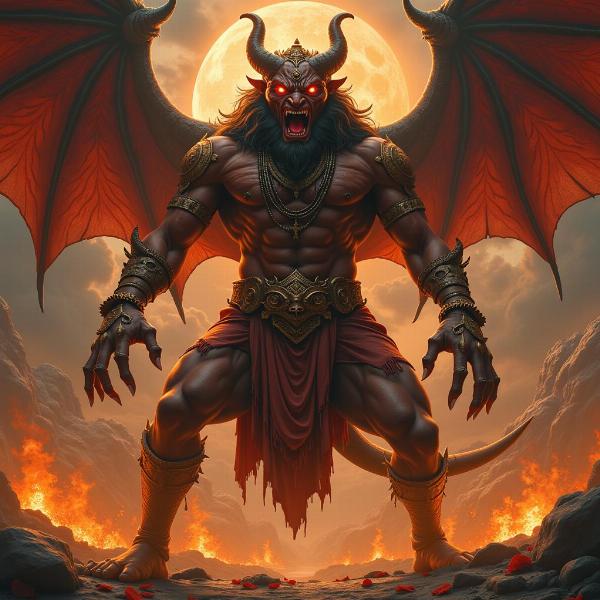Understanding the Hindi meaning of “giant” opens up a fascinating exploration of language, mythology, and cultural nuances. “Giant” refers to something exceptionally large or a person of extraordinary size and strength. In Hindi, several words capture the essence of “giant,” each with its own subtle connotations. This article will delve into these various translations, exploring their usage and cultural significance.
Exploring Hindi Translations of “Giant”
The most common Hindi word for “giant” is “विशालकाय” (vishalkaay). This term aptly describes something of immense size, encompassing both physical objects and living beings. Think of towering mountains or massive trees – vishalkaay perfectly captures their enormity. When referring to a person, vishalkaay emphasizes their imposing physical stature.
Another commonly used word is “दानव” (daanav). This word carries a more mythological connotation, often referring to demons or giants in ancient Hindu scriptures. Daanavs are depicted as powerful beings, often adversarial, with superhuman strength and size. Therefore, using daanav adds a layer of mythical significance to the concept of “giant.”
A less frequent but equally evocative term is “राक्षस” (rakshas). Similar to daanav, rakshas carries mythological baggage, representing demons or ogres. Rakshasas are often portrayed as malevolent beings with frightening appearances and extraordinary size. Using this term evokes a sense of fear and awe, emphasizing the monstrous aspect of a giant.
Giant in Hindi Mythology and Folklore
Giants play a prominent role in Hindi mythology and folklore, often representing powerful forces of nature or supernatural beings. The epics Ramayana and Mahabharata are filled with tales of giants, both benevolent and malevolent. These stories highlight the awe and fear that giants inspired in ancient cultures. For example, the character of Ravana in the Ramayana is described as a ten-headed rakshas, symbolizing his immense power and malevolence.
Modern Usage of “Giant” in Hindi
Today, the word “giant” and its Hindi equivalents are used in various contexts. From describing large corporations as “corporate giants” (“कॉर्पोरेट दिग्गज” (corporate diggaj)) to marveling at the “giant leap” (“विशाल छलांग” (vishal chhalaang)) in technological advancements, these terms are seamlessly integrated into everyday language.  Daanav – The Mythological Giant
Daanav – The Mythological Giant
How do you say “A Giant Leap for Mankind” in Hindi?
The iconic phrase “A giant leap for mankind” can be translated into Hindi as “मानवता के लिए एक विशाल छलांग” (maanavta ke liye ek vishal chhalaang). This translation effectively captures the essence of the original phrase, highlighting the significance of the achievement.
Different Contexts, Different Meanings
The specific Hindi word used to translate “giant” depends heavily on the context. While vishalkaay is a general term for something large, daanav and rakshas are more specific, carrying mythological connotations. Choosing the right word is crucial for conveying the intended meaning accurately.
Conclusion
Understanding the various Hindi meanings of “giant” enriches our appreciation for the nuances of language and culture. From the imposing vishalkaay to the mythical daanav and rakshas, each term offers a unique perspective on the concept of “giant.” By exploring these different translations, we gain a deeper understanding of Hindi language and its rich cultural heritage. Using the appropriate term in different contexts ensures accurate and effective communication.
FAQs
- What is the most common Hindi word for “giant”? The most common Hindi word for “giant” is “विशालकाय” (vishalkaay).
- What are some other Hindi words that can be used for “giant”? Other Hindi words for “giant” include “दानव” (daanav) and “राक्षस” (rakshas).
- What is the difference between “daanav” and “rakshas”? Both refer to mythological beings of great size and power, but “daanav” generally refers to demons, while “rakshas” often describes ogres or malevolent beings.
- How is “giant” used in modern Hindi? “Giant” and its Hindi equivalents are used in various contexts, from describing large corporations to significant achievements.
- How do you say “a giant leap for mankind” in Hindi? The phrase translates to “मानवता के लिए एक विशाल छलांग” (maanavta ke liye ek vishal chhalaang).
Meaning-Hindi.in is your one-stop solution for all your Hindi translation needs. We offer a wide range of translation services, from business and legal documents to technical manuals and website localization. Our team of expert translators ensures accurate and culturally sensitive translations, catering to diverse client needs. For high-quality, reliable Hindi translation services, contact us at [email protected] or call us at +91 11-4502-7584. Meaning-Hindi.in is committed to delivering exceptional language solutions that bridge communication gaps and foster global understanding.